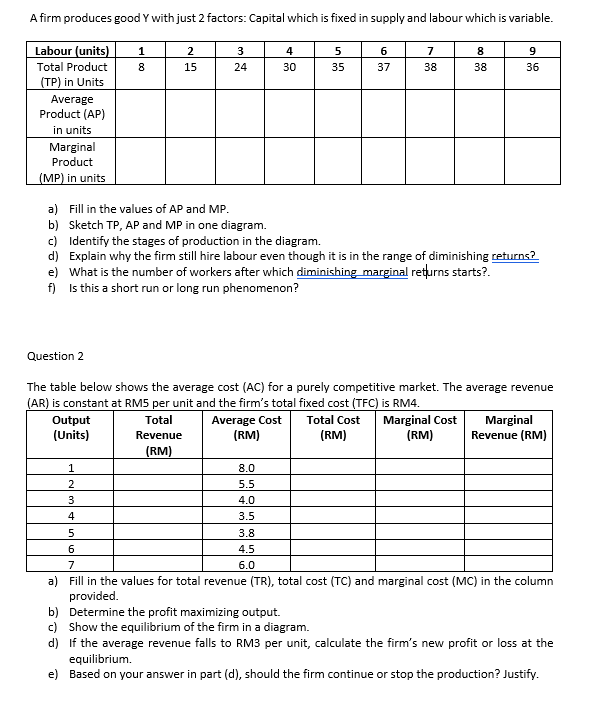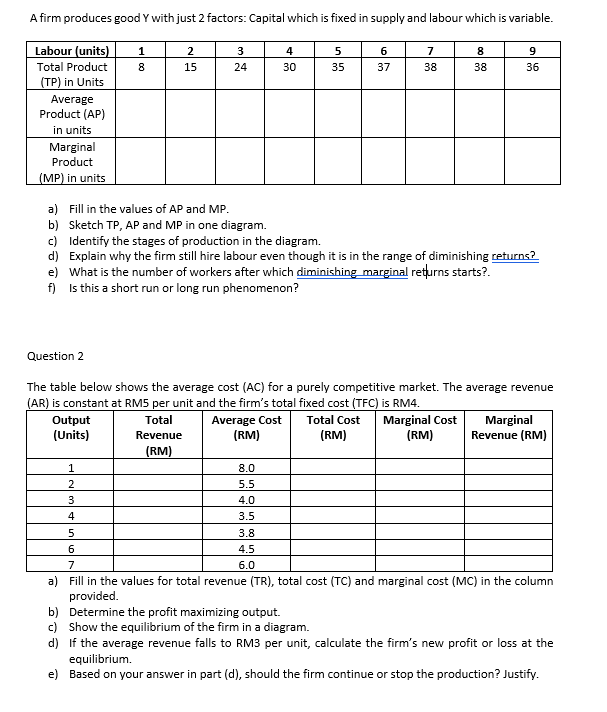A firm produces good Y with just 2 factors: Capital which is fixed in supply and labour which is variable. Labour (units) Total Product (TP) in Units 2 3 4. 5 6. 9 8 15 24 30 35 37 38 38 36 Average Product (AP) in units Marginal Product (MP) in units a) Fill in the values of AP and MP. b) Sketch TP, AP and MP in one diagram. c) Identify the stages of production in the diagram. d) Explain why the firm still hire labour even though it is in the range of diminishing returns? e) What is the number of workers after which diminishing marginal returns starts?. f) Is this a short run or long run phenomenon?
A firm produces good Y with just 2 factors: Capital which is fixed in supply and labour which is variable. Labour (units) Total Product (TP) in Units 2 3 4. 5 6. 9 8 15 24 30 35 37 38 38 36 Average Product (AP) in units Marginal Product (MP) in units a) Fill in the values of AP and MP. b) Sketch TP, AP and MP in one diagram. c) Identify the stages of production in the diagram. d) Explain why the firm still hire labour even though it is in the range of diminishing returns? e) What is the number of workers after which diminishing marginal returns starts?. f) Is this a short run or long run phenomenon?
Chapter11: The Firm: Production And Costs
Section: Chapter Questions
Problem 15P
Related questions
Question

Transcribed Image Text:A firm produces good Y with just 2 factors: Capital which is fixed in supply and labour which is variable.
Labour (units)
1
4
5
7
8
9
Total Product
8
15
24
30
35
37
38
38
36
(TP) in Units
Average
Product (AP)
in units
Marginal
Product
(MP) in units
a) Fill in the values of AP and MP.
b) Sketch TP, AP and MP in one diagram.
c) Identify the stages of production in the diagram.
d) Explain why the firm still hire labour even though it is in the range of diminishing returns?
e) What is the number of workers after which diminishing marginal returns starts?.
f) Is this a short run or long run phenomenon?
Question 2
The table below shows the average cost (AC) for a purely competitive market. The average revenue
(AR) is constant at RM5 per unit and the firm's total fixed cost (TFC) is RM4.
Output
(Units)
Average Cost
(RM)
Marginal Cost
(RM)
Total
Total Cost
Marginal
Revenue (RM)
Revenue
(RM)
(RM)
8.0
2
5.5
3
4.0
4
3.5
3.8
6
4.5
7
6.0
a) Fill in the values for total revenue (TR), total cost (TC) and marginal cost (MC) in the column
provided.
b) Determine the profit maximizing output.
c) Show the equilibrium of the firm in a diagram.
d) If the average revenue falls to RM3 per unit, calculate the firm's new profit or loss at the
equilibrium.
e) Based on your answer in part (d), should the firm continue or stop the production? Justify.

Transcribed Image Text:A firm produces good Y with just 2 factors: Capital which is fixed in supply and labour which is variable.
Labour (units)
1
4
5
7
8
9
Total Product
8
15
24
30
35
37
38
38
36
(TP) in Units
Average
Product (AP)
in units
Marginal
Product
(MP) in units
a) Fill in the values of AP and MP.
b) Sketch TP, AP and MP in one diagram.
c) Identify the stages of production in the diagram.
d) Explain why the firm still hire labour even though it is in the range of diminishing returns?
e) What is the number of workers after which diminishing marginal returns starts?.
f) Is this a short run or long run phenomenon?
Question 2
The table below shows the average cost (AC) for a purely competitive market. The average revenue
(AR) is constant at RM5 per unit and the firm's total fixed cost (TFC) is RM4.
Output
(Units)
Average Cost
(RM)
Marginal Cost
(RM)
Total
Total Cost
Marginal
Revenue (RM)
Revenue
(RM)
(RM)
8.0
2
5.5
3
4.0
4
3.5
3.8
6
4.5
7
6.0
a) Fill in the values for total revenue (TR), total cost (TC) and marginal cost (MC) in the column
provided.
b) Determine the profit maximizing output.
c) Show the equilibrium of the firm in a diagram.
d) If the average revenue falls to RM3 per unit, calculate the firm's new profit or loss at the
equilibrium.
e) Based on your answer in part (d), should the firm continue or stop the production? Justify.
Expert Solution
This question has been solved!
Explore an expertly crafted, step-by-step solution for a thorough understanding of key concepts.
Step by step
Solved in 4 steps with 2 images

Knowledge Booster
Learn more about
Need a deep-dive on the concept behind this application? Look no further. Learn more about this topic, economics and related others by exploring similar questions and additional content below.Recommended textbooks for you

Exploring Economics
Economics
ISBN:
9781544336329
Author:
Robert L. Sexton
Publisher:
SAGE Publications, Inc



Exploring Economics
Economics
ISBN:
9781544336329
Author:
Robert L. Sexton
Publisher:
SAGE Publications, Inc



Principles of Economics, 7th Edition (MindTap Cou…
Economics
ISBN:
9781285165875
Author:
N. Gregory Mankiw
Publisher:
Cengage Learning

Principles of Microeconomics (MindTap Course List)
Economics
ISBN:
9781305971493
Author:
N. Gregory Mankiw
Publisher:
Cengage Learning

Principles of Economics (MindTap Course List)
Economics
ISBN:
9781305585126
Author:
N. Gregory Mankiw
Publisher:
Cengage Learning